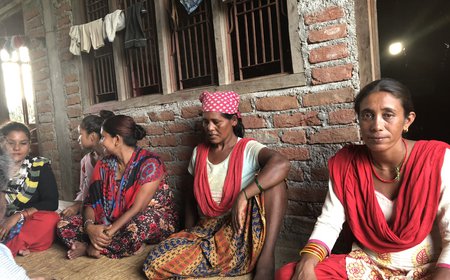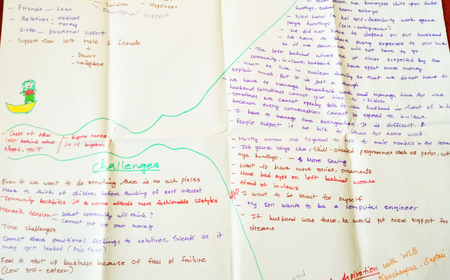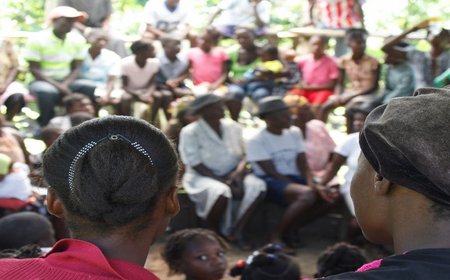A year and a half into the MIDEQ project, the team of researchers working on the Gender Work Package took the opportunity to reflect on: (i) shared understandings of key concepts on gender, migration and inequality from the perspective of the migration corridors under investigation; and (ii) the collaborative relationships and practices that we have established in the project to date, and how to build on these going forward.
With this in mind, we organised a two-day virtual workshop with the project country teams working on the gender work package, Ghana, China, Malaysia and Nepal (colleagues from Haiti were unable to join this occasion). Our aim was to:
- deepen collaboration and foster mutual understanding across the teams working on gender;
- strengthen synergies in our theoretical and conceptual approaches; and
- identify specific research interests and challenges across different migratory contexts and teams.
The meeting was very informative and lively, with discussions ranging from different understandings of gender and the relevance of an intersectionality lens across geographical contexts, to methodological reflections around challenges and ethical questions in relation to interviewing migrants during the pandemic.
Our discussions began with a consideration of the three key foci of the gender work package – on gendered migration flows, the consequences of migration for gender inequalities and the nature of gendered social networks. These served as a springboard for theoretical discussions on gender and intersectionality as well as conversations with a more practical focus on conducting empirical research. The latter focused in particular on considerations such as how do we get where we would like to be; how do we collectively decide the focus of the gender theme; and what are our respective relationships to the project as work package and country leads, as established academics and as Early Career Researchers (ECRs).
We were also interested in thinking through how we relate to each other within the project and to our research participants. These conversations were underpinned by the ambition to decolonise gender and migration research, albeit often more implicitly than explicitly.
Gender
Moving on from the broadly accepted definition of gender as socially constructed differences between women and men, we debated the extent to which gender is a Western construct. The introduction of the use of gender in the social sciences more broadly, as well as in the gender and migration literature, was closely linked to the Western feminist movement of the 1970s. Yet, there are many examples where indigenous notions of gender have been fundamentally different to those put forward by Western feminist scholars. This includes the research of academics such as Ifi Amadiume and Irene Silverblatt who argue that pre-colonial gender relations in Nigeria and Peru respectively were premised upon more complex understandings of gender resulting in greater complementarity between gender roles. In turn, Walter Williams challenges the dichotomy of man/woman on which the concept of gender rests, by describing how among North American indigenous groups there is a third gender, the ‘two-spirit person’, who is neither female nor male, but both at the same time.
With this in mind, we reflected on how gender is often invisible because it is naturalised; while in other contexts, it is the difference in gender relations across rural settings, and between rural and urban contexts, that makes it difficult to generalise. The discussion went on to highlight how patriarchal relations also affect men and the need for a more relational approach which considers how both migration and women’s actions affect men as well as women. As such, we affirmed that both women and men need to be involved in progressive social change (as ‘agents of change’) to break down gender-based inequalities.
Intersectionality
Turning to intersectionality as a lens to look at cumulative and compounding inequalities, we traced the genealogy of the approach to Kimberlé Crenshaw’s seminal work. In recognising its origins in U.S. feminist legal theory and race studies, we debated the universal salience of intersectionality as a frame for understanding difference across the various migration corridors. We were also interested in uncovering methodological obstacles to deploying an intersectional lens in practice.
Overall, while there was a desire to retain the complexity embedded in the term itself – with its capacity for incorporating multiple intersecting dimensions of inequality – we agreed that there was a need to reflect upon those aspects of intersectionality which had a particular local relevance, while remaining wary of losing the focus on gender relations. It was also acknowledged that while the intersectional approach emerged from an imperative to understand discrimination, it is now sometimes deployed to understand the ‘positive’ intersections that underpin difference – or even privilege – as well as those ‘negative’ intersections that compound disadvantage. But at the same time – and despite its roots in race studies – there has been a relative silence around race issues in migration studies. Indeed, there was some agreement that we often end up talking about ‘xenophobia’ rather than racism because this is seen as being less threatening.
Local sensitivities matter and there may not be a direct translation available in every language for the terms associated with intersectionality. However, it is important to acknowledge these issues explicitly and to continue the conversation about which intersections are foregrounded and which are given less attention. For example, the migration literature is fairly silent about disability as there is an assumption that those who engage in migration, particularly for work, are young and able-bodied. Caste and sexuality were also identified as insufficiently explored in relation to migration even while they might be strong push factors for those who are migrating.
Decentering gender and migration research
Finally, experiences were shared on how to apply MIDEQ’s principles of decentred and multi-sited research in practice. These aim to empower both participating researchers in the North and South as well as the migrants and communities we engage with in the project, and are arguably more relevant than ever in the context of the restrictions and hardships imposed by the COVID-19 pandemic.
Despite the challenges, participants valued the opportunities that digital and online technologies offer for meetings and interviews. Knowledge of the context and the groups and individuals we work with, as well as good communication and relationship building skills, were acknowledged to be as crucial as ever in building rapport with interviewees. This allows them to express themselves in a trustful and safe environment and to feel positive about their participation. At the same time, and especially given the current health crisis, we also agreed to embrace the original principles embedded in the feminist ethics of care, by taking care of ourselves, our teams, and the people we work with (or at least to attempt to).
As we drew the workshop to a close, we agreed that in order to develop novel thinking and innovative approaches, it would be important to continue our discussion since we recognised the value of continued dialogue among us all. We, therefore, agreed to organise regular events to continue to discuss key terminology and concepts underpinning our work, through a reading group and further workshops. Convenorship of meetings will be rotated among us as will the responsibility for setting the agenda.



